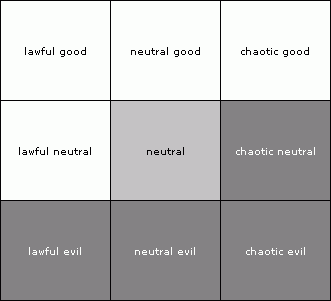The new trailer for the upcoming “Batman vs Superman” movie are upon us, and something is amiss!
Gone, apparently are the utopian days of the “Superfriends” I grew up with...
Smiling family portraits and spandex have given way to fistfights in thunderstorms and unkind graffiti.
This messes with my head. Shouldn't Superman and Batman be on the same side? But how can they, when their whole approach, indeed, their very definitions of "justice" might be completely different? Damn you, postmodernism. I preferred it when the Superfriends just got along and played frisbee with Wonder Dog on the front lawn of the Hall of Justice.
I was wondering how I might unpack this into an ethics lesson for students when I realised a connection with Dungeons and Dragons.
In D&D, players use a character alignment grid with a 3x3 matrix to describe the attributes of their character. Lawful -> Neutral -> Chaotic lays along one axis, and Good -> Neutral -> Evil lays along the other, thus:
Putting well-known fictional characters into such a grid is apparently, a popular game, as any Google image search shows.
So what attributes can we ascribe to Superman? He obeys the law. He believes in the system. He is incorruptibly (Black kryptonite notwithstanding) good, and takes his cues about what that notion of goodness is from an outside source (Remember, "Truth, justice and the American Way"?) He is not impelled by a sense of vengeance.
And Batman? He's a vigilante. He mistrusts the system's ability to deliver justice and gladly bypasses the system to deliver his own judgement on the scum of Gotham city. His wealth and power gives him the ability to make his own rules and determinations about what "good" is. Finally, he is motivated, at least in part, by his desire for vengeance over the death of his parents as a boy.
We call Superman's willingness to take "the American Way" (whatever that is) as the benchmark for goodness as a Deontological ethical framework. This is just a fancy way of saying that ultimate judgements about what is good and evil are externalised to some degree. They may be "handed down" to us, so to speak. People who believe in God may ascribe their sense of morality to scripture. Unfortunately, they then go on to be exceedingly proscriptive in areas in which scripture may not be clear. It has been said that trying to understand the true meaning of the Bible without interpretation is like trying to eat an apple without chewing it, but that leads us to a discussion we will have another time.
In contrast, Batman's ethical framework could be said to be Utilitarian or Consequentialist (two related terms), meaning that the "goodness" of an action is largely determined by the outcome, and not by some immutable external measure.
In fact, it has been said that the intent of a person employing a Utilitarian ethical worldview is less important than the outcome they achieve.
This leads us to the central question of any lesson you might lead on the question of superhero ethics, and that is
"Is it ever OK to do a bad thing for a good reason?"
Superman would answer that question "no", and Batman would probably answer "sometimes". What do you think?


No comments:
Post a Comment